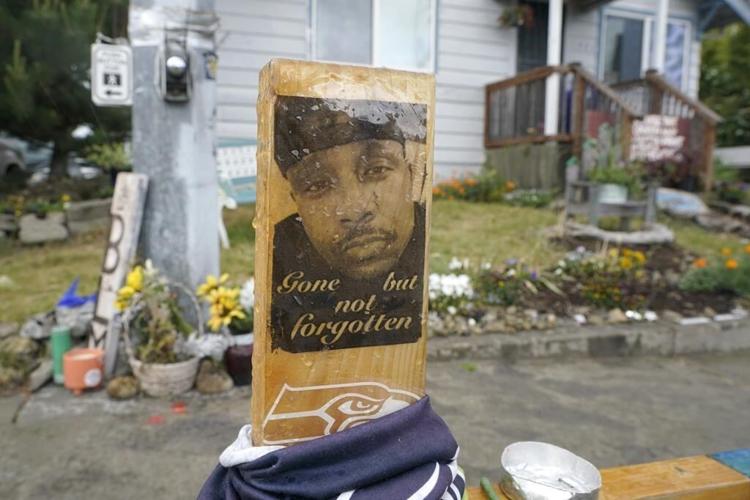SEATTLE (AP) — Washington state lawmakers considered a proposal Monday to prohibit police from hog-tying suspects, nearly four years after Manuel Ellis, a 33-year-old Black man, died facedown with his hands and feet cuffed together behind him in a case that became a touchstone for racial justice demonstrators in the Pacific Northwest.
The restraint technique has long drawn concern due to the risk of suffocation, and while many cities and counties have banned the practice, it remains in use in others.
Monet Carter-Mixon, Ellis’ sister, described hog-tying as akin to what is done to animals before they are branded or when they are being prepared for slaughter.
“It’s inhumane for animals, so it should be inhumane to humans as well,” she said during the Senate committee hearing.
Democratic Sen. Yasmin Trudeau, who , told The Associated Press she doesn’t want anyone else to experience the “dehumanization” Ellis faced before his death.
“How do we move through the need for folks to enforce the laws, but do it in a way where they’re treating people the way we expect, which is as human beings?” she said.
In the last four years, states across the U.S. have rushed to pass , prompted by racial injustice protests and the death of and others at the hands of law enforcement. Few have banned prone restraint, according to the ��ɫtv Conference of State Legislatures.
California prohibited law enforcement in 2021 that “involve a substantial risk of positional asphyxia,” in which the body's position hinders the ability to breathe. That same year, Minnesota banned correctional officers from using prone restraint unless “deadly force is justified.”
The U.S. Department of Justice has recommended against the practice since at least 1995 to avoid deaths in custody, and it.
The attorney general’s office in Washington recommended against using hog-tying in its model use-of-force policy released in 2022. At least four local agencies continue to permit it, according to policies they submitted to the attorney general’s office that year.
The Pierce County Sheriff’s Department said it still allows hog-tying but declined to comment on the bill. One of the department's deputies was involved in restraining Ellis, whose face was covered by a spit-hood when he died.
Ellis was when he passed a patrol car with Tacoma police officers Matthew Collins and Christopher Burbank, who are white. Burbank and Collins said Ellis tried to get into a stranger’s car and then attacked the officers when they confronted him in the city about 30 miles (50 kilometers) south of Seattle.
Witnesses said the officers jumped out of their car as Ellis walked by and knocked him to the ground.
He was shocked and beaten. Officers wrapped a hobble restraint device around his legs and linked it to his handcuffs behind his back while he remained in the prone position, according to a filed by the Washington attorney general’s office.
After the hobble was applied, Ellis stopped moving, the statement said.
A medical examiner ruled his death a homicide caused by lack of oxygen. Collins, Burbank and a third officer, Timothy Rankine, were charged with murder or manslaughter. Defense attorneys argued Ellis' death was caused by methamphetamine intoxication and a heart condition, and a jury in December.
Jamika Scott, Tacoma city council member, testified Monday in favor of banning hog-tying, calling it an “inhumane practice.”
“This bends a body into a bow shape and as you can imagine this does not leave a lot of room for you to get oxygen into your lungs," she said. “It makes it really hard.”
James McMahan, policy director at the Washington Association of Sheriffs and Police Chiefs, asked the Legislature not to ban tactics needed in order for law enforcement to keep a person from hurting officers or themselves.
“We would suggest instead of banning this tactic entirely, the legislature facilitate the use of better alternatives," he said. "We envision a grant program to acquire these alternatives, where grant recipients must agree to prohibit the use of hogties in their policies as a condition of receiving these funds.”
He did not specify which alternatives he was referencing, saying he didn't want to promote a specific one.
Democratic Sen. John Lovick, who worked as a state trooper for more than 30 years, joined Trudeau in sponsoring the bill.
Republican Rep. Gina Mosbrucker, a member of the House public safety committee, said she looked forward to learning more about the legislation.
“If it does turn out that this form of restraint for combative detainees is dangerous in any way, then I think the state should put together a grant and some money to buy and train on alternative methods to make sure that the officer and the person arrested is safe,” she said.
The bill comes a few years after a wave of passed in the state in 2021.
The legislation included requirements that officers could use force only when they had probable cause to make an arrest or to prevent imminent injury, and required them to use appropriate de-escalation tactics if possible.
The following year, Democratic Gov. Jay Inslee approved bills fixing some elements of that legislation, including making it clear officers may use force to help detain or transport people in behavioral health crises.










































